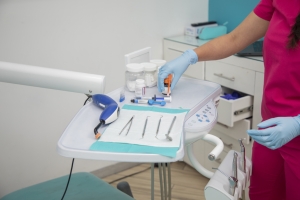
Andrea Moore, LMSW, Health Equity Specialist, Quality Insights Renal Network 5
1. Before January 1, 2023, Medicare would pay for a dental exam only for patients who were actively seeking a kidney transplant. Now, the new Medicare dental rule will pay for a dental exam and dental treatment (e.g., dental filling, teeth removal, replacement of teeth, etc.) for patients actively seeking any organ transplant. If you are living with kidney disease–with or without dialysis–Medicare will not pay for preventative care, like teeth cleanings.
What this means for you: If you have Medicare and are actively seeking transplant, meaning you are undergoing transplant workup or are actively on the transplant waitlist, you have more dental coverage now than you did before January 1, 2023.
2. Only 3 to 4 percent (%) of practicing dentists are enrolled as a Medicare provider, meaning these providers accept Medicare as payment for dental services.
Medicare will pay for dental exams and treatments only done by dentists, including oral surgeons, who are enrolled in Medicare.
What this means for you: If your current dentist is not enrolled in Medicare, your Medicare insurance will not pay for services performed by your dentist. When scheduling an appointment with a dentist always ask if they accept Medicare Part A or Part B for payment.
- If your dentist would like to enroll in Medicare as a provider or supplier: Forms are available HERE and HERE
- If your dentist has questions about enrolling in Medicare and would like to talk with a Medicare Fee-for-Service Provider Enrollment contractor in your state: Contact list available HERE
3. As of February 2023, 40 states (including DC) have adopted Medicaid expansion. Medicaid expansion offers Medicaid-eligible adults dental benefits. The benefits Medicaid-eligible adults receive differ based on the state in which they live. Although most states have adopted the Medicaid expansion, only 39 percent (%) of dentists throughout the United States accept Medicaid as payment for dental services.
What this means for you: Not all dentists accept Medicaid. However, if you have state Medicaid you will have an easier time finding a dentist who will treat you than if you have Medicare as your only insurance. When scheduling an appointment with a dentist always ask if they accept your state’s Medicaid as payment.
who will treat you than if you have Medicare as your only insurance. When scheduling an appointment with a dentist always ask if they accept your state’s Medicaid as payment.
4. If you are seeking dental services as a person with Medicare insurance who is actively seeking transplant, it is important that your primary care doctor or transplant team speak with your dentist before you receive dental services. Communication between the dentist and your primary care doctor or transplant team is important to making sure your dental care will be paid for.
What this means for you: Have your doctor or transplant team send a referral to the dentist before receiving dental treatment. The communication between the doctor and dentist is one of the most important steps to having your dental services paid for by Medicare.
References:
Center for Health Care Strategies, Inc. (2019). Medicaid adult dental benefits: an overview [Fact sheet]. https://www.chcs.org/media/Adult-Oral-Health-Fact-Sheet_091519.pdf
Center for Medicare and Medicaid Services. (2022). Calendar year (CY) 2023 Medicare physician fee schedule final rule [Fact sheet]. https://www.cms.gov/newsroom/fact-sheets/calendar-year-cy-2023-medicare-physician-fee-schedule-final-rule
Kaiser Family Foundation. (2023). Status of state action on the Medicaid expansion decision [Fact sheet]. https://www.kff.org/health-reform/state-indicator/state-activity-around-expanding-medicaid-under-the-affordable-care-act/?currentTimeframe=0&sortModel=%7B%22colId%22:%22Location%22,%22sort%22:%22asc%22%7D
Walters, A. (2021, February 25). To opt-in or opt-out: what every dentist needs to know about Medicare. EisnerAmper. https://www.eisneramper.com/medicare-dentist-should-know-0321/




